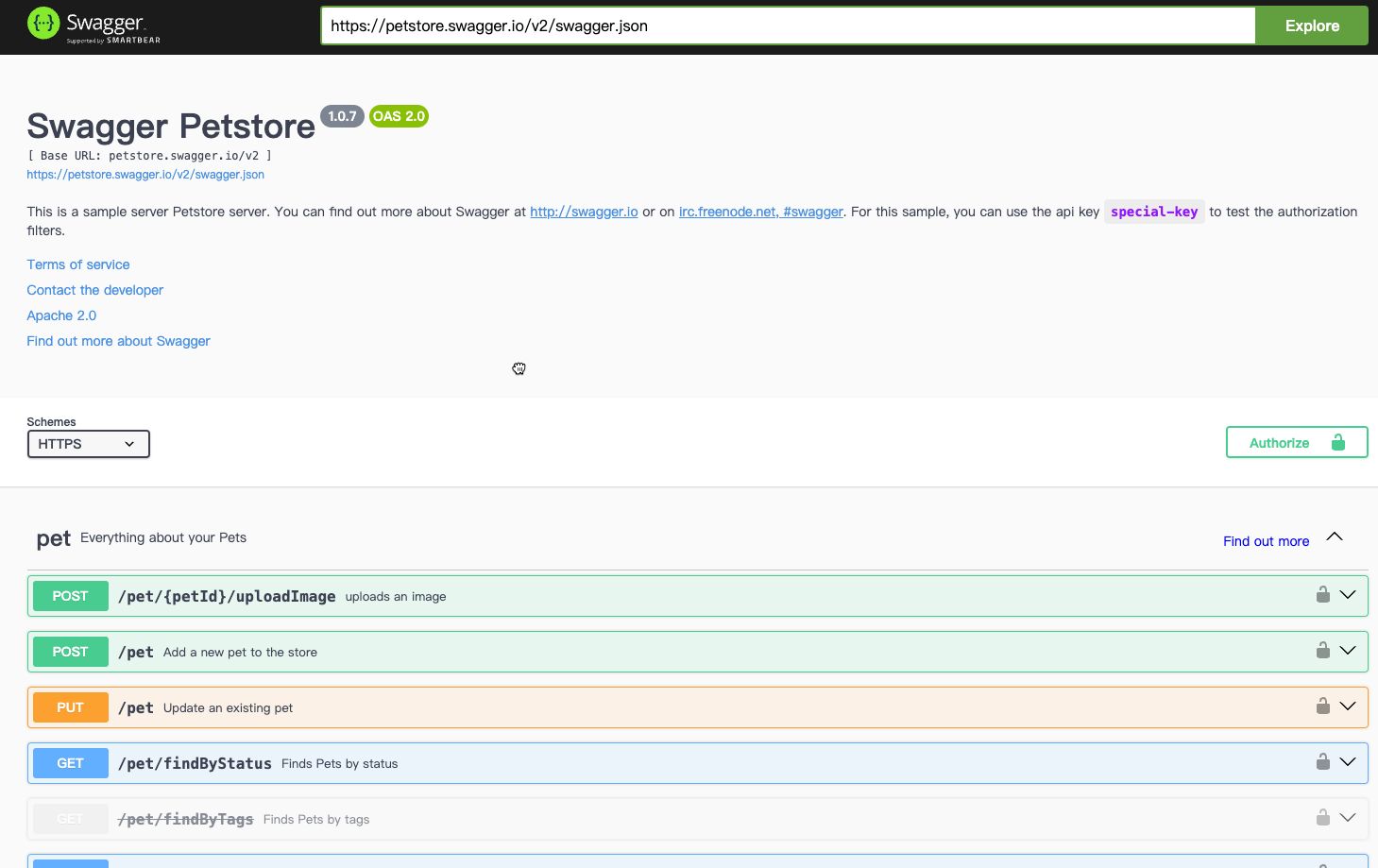OpenAPI
将 Swagger 文档生成前端所需的接口请求、Mock 文件和文档说明。
启用方式
- 安装插件
$ npm add @winner-fed/plugin-openapi -D$ yarn add @winner-fed/plugin-openapi -D$ pnpm add @winner-fed/plugin-openapi -D$ bun add @winner-fed/plugin-openapi -D- 在配置文件中
.winrc中开启该功能
import { defineConfig } from 'win';
export default defineConfig({
plugins: [require.resolve('@winner-fed/plugin-openapi')],
/**
* @name mobileLayout 插件
* @doc https://winjs-dev.github.io/winjs-docs/plugins/openapi.html
*/
openAPI: {
requestLibPath: "import { request } from 'winjs'",
schemaPath: "https://petstore.swagger.io/v2/swagger.json",
mock: true,
}
});- 在项目根目录的
package.json文件的 scripts 增加一个命令。
{
"scripts": {
"openapi": "win openapi"
}
}最后我们就可以执行 npm run openapi 来生成相关的接口和文档。
配置
openAPI: {
// 自定义请求方法路径
requestLibPath: joi.string(),
// Swagger 2.0 或 OpenAPI 3.0 的地址
schemaPath: joi.string(),
// 生成的文件夹的路径,默认为 src/services
serversPath: joi.string(),
// 是否生成 Mock 文件
mock: joi.boolean(),
// 项目名称,默认取 package.json 的name,否则为 openapi
projectName: joi.string(),
// api 的前缀
apiPrefix: joi.alternatives(joi.string(), joi.function()),
// 命名空间名称,默认为 API
namespace: joi.string(),
// 自定义 hook
hook: joi.object({
// 自定义请求方法函数名称
customFunctionName: joi.function(),
// 自定义类名
customClassName: joi.function()
})
}如何使用
openAPI 对于后端是有一些工作量的,但是工作量远远小于维护一个文档的成本,如果维护一个文档,那么每次更新完代码就需要重新编辑一遍文档。而使用 openAPI 的方式只要接入 swagger 然后做一些配置就可以生成一个界面,如果你使用的是 python 或者是 java,那么接入会变得异常简单。详细的接入步骤可以看 swagger 的官方文档。这里主要介绍前端如何使用。
后端接入完成 swagger 之后,我们可以访问 swagger 生成的文档,一般来说都是 http://localhost:8080/swagger-ui.html,访问页面我们可以拿到一个 openapi 的规范文件。这里以官方的 petstore 为例说明

我们需要复制 swagger 的 url 到 openapi 的配置中,我们配置一下:
openAPI: {
requestLibPath: "import { request } from 'winjs'",
schemaPath: "https://petstore.swagger.io/v2/swagger.json",
mock: false,
}这里有两个配置 requestLibPath 和 mock 需要注意一下。
requestLibPath
requestLibPath 可以如何使用 request, 一般而言我们推荐直接使用 winjs 的 request,但是有些时候需要自定义,可以修改 requestLibPath 的配置,比如要使用 utils 的中的 request,我们可以这么配置:
openAPI: {
requestLibPath: "import request from '@utils/request'",
schemaPath: "https://petstore.swagger.io/v2/swagger.json",
mock: false,
}当然需要保证 schemaPath 配置引入 request,不然生成的代码可能无法执行。生成的代码如下:
// requestLibPath 的配置
import { request } from "winjs";
/** Create user This can only be done by the logged in user. 返回值: successful operation POST /user */
export async function createUser(
body: API.User,
options?: { [key: string]: any }
) {
return request<any>("/user", {
method: "POST",
headers: {
"Content-Type": "application/json",
},
data: body,
...(options || {}),
});
}注释也会自动载入,省去了我们查文档的麻烦,同时在 serves 中我们也会生成 typings.d.ts 文件,里面有 openapi 中包含所有定义。API.User 就是后端需要返回的数据的描述,例子如下:
declare namespace API {
type User = {
id?: number;
username?: string;
firstName?: string;
lastName?: string;
email?: string;
password?: string;
phone?: string;
/** User Status */
userStatus?: number;
};
}mock
mock 就比较简单了,配置为 true 之后会自动生成一些 mock 的文件,虽然质量不如我们人肉写的,但是在开发中使用已经没问题了。生成的 mock 文件在项目根路径下的 mock 文件中,生成的 mock 数据每次都不同,如果要调试可以随意修改,只有执行 npm run openapi 才会进行修改。
// @ts-ignore
export default {
"GET /pet/:petId": (req, res) => {
res.status(200).send({
id: 84,
category: { id: 63, name: "刘明" },
name: "doggie",
photoUrls: [
"https://ant.design",
"https://preview.pro.ant.design/dashboard/analysis",
"https://ant.design",
"https://procomponents.ant.design/",
"https://preview.pro.ant.design/dashboard/analysis",
"https://github.com/umijs/dumi",
"https://github.com/umijs/dumi",
"https://github.com/umijs/dumi",
"https://preview.pro.ant.design/dashboard/analysis",
"https://procomponents.ant.design/",
"https://ant.design",
"https://procomponents.ant.design/",
],
tags: [
{ id: 62, name: "赖敏" },
{ id: 74, name: "郑平" },
{ id: 74, name: "孙娜" },
{ id: 61, name: "邱秀英" },
{ id: 77, name: "邱涛" },
{ id: 74, name: "文超" },
{ id: 82, name: "贾刚" },
{ id: 83, name: "熊明" },
{ id: 71, name: "余丽" },
{ id: 81, name: "陆军" },
{ id: 83, name: "孔勇" },
{ id: 63, name: "朱明" },
{ id: 89, name: "钱平" },
{ id: 76, name: "李秀兰" },
],
status: "available",
});
},
};文档
在开发中我们不能只看代码,也是需要看文档的。插件中也默认集成了以下 swagger-ui ,提供了一个界面可以读取当前项目中的 openapi 配置。 这个操作只在开发环境有效。我们可以访问 /win/plugin/openapi 来查看,最后的效果应该是这样的:

